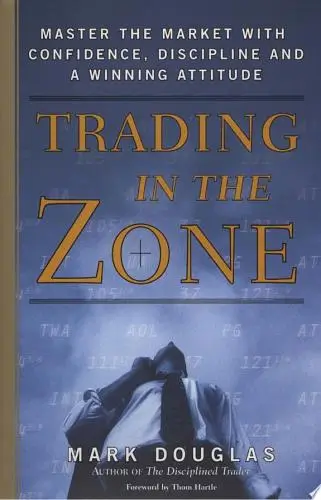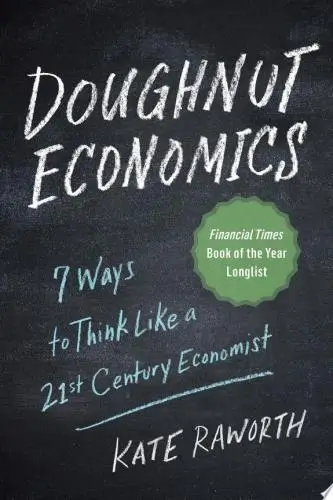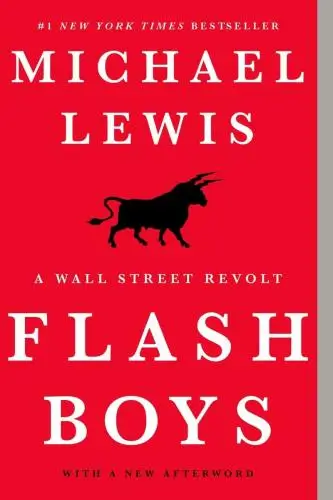Flash Boys
A Wall Street Revolt
What's it about?
Flash Boys by Michael Lewis dives into the high-stakes world of high-frequency trading on Wall Street. This eye-opening book reveals how a group of misfit traders discovered the way the market was rigged and set out to level the playing field. Through a gripping narrative, Lewis explores the ethical and financial complexities of the stock market, shedding light on the shadowy side of electronic trading. Flash Boys is a thrilling journey through the financial system that questions fairness and the very foundation of the market economy.
About the Author
Michael Lewis is an American author celebrated for his keen insights into finance, economics, and sports. Notable works include "The Big Short," "Moneyball," and "Flash Boys," where he masterfully blends investigative journalism with storytelling. His writing often exposes systemic flaws and champions underdogs, showcasing his distinctive narrative skill and deep understanding of complex topics.
10 Key Ideas of Flash Boys
Exploiting High-Frequency Trading (HFT) for Fairer Markets
High-frequency trading leverages advanced algorithms and speed to outmaneuver traditional traders.
By understanding how HFT firms exploit microseconds advantages, one can devise strategies that mitigate these effects, such as routing orders in a way that avoids detection by predatory HFT algorithms.
This knowledge can lead to the development of systems that ensure more equitable trading conditions for all market participants.
Learn DeeperEducate Yourself on HFT Practices: Start by understanding the basics of high-frequency trading. Look for resources that explain how HFT works, its impact on the market, and why it can be advantageous or detrimental to different types of traders.
Use HFT-Resistant Brokers: Choose brokers that offer tools or strategies designed to protect orders from being exploited by high-frequency traders. Some brokers have developed technologies that disguise the order flow or route orders in a way that minimizes exposure to predatory HFT practices.
Implement Order Routing Strategies: Learn about and utilize advanced order routing strategies that can help avoid detection by HFT algorithms. This might include using 'iceberg' orders that hide the true size of your order or 'smart' routing that dynamically chooses the best path for your order to minimize HFT interception.
Stay Informed About Market Structure Changes: The financial markets are constantly evolving, with new rules and technologies emerging. Stay informed about these changes, as they can affect how HFT operates and what strategies might be most effective in mitigating its impact.
- Example
An individual investor notices that their trades often result in worse prices than expected. They learn about HFT and decide to switch to a broker that offers smart order routing technology, which helps to protect their trades from being picked off by high-frequency traders.
- Example
A small investment firm realizes that their large orders are being detected and exploited by HFT firms. They start using iceberg orders, breaking up their large orders into smaller, less detectable ones, thereby reducing the adverse impact of HFT on their trades.
Building a Faster, More Ethical Trading Infrastructure
The creation of a new, high-speed trading infrastructure that prioritizes fairness over speed alone can revolutionize the market.
By focusing on ethical practices and transparency, this infrastructure can reduce the predatory aspects of HFT, ensuring that no participant has an undue advantage.
This involves constructing physical and digital networks that minimize the latency advantages exploited by HFT firms.
Learn DeeperStay Informed About Your Investments: Regularly research and understand the platforms or brokers you use for trading. Look for those that prioritize transparency and ethical practices in their operations.
Support Ethical Trading Platforms: Choose to invest through platforms that are known for fair trading practices and that advocate for reducing the advantages of high-frequency trading (HFT) firms. This can include platforms that offer flat-rate fees without giving preferential treatment to HFT.
Advocate for Transparency and Fairness: Engage in discussions, forums, or social media conversations about the importance of ethical trading practices. Support regulations or initiatives that aim to level the playing field for all investors.
Educate Yourself on Market Structure: Understanding how the market works, including the role of HFT and its impact, can help you make more informed decisions. Look for resources or courses that explain these concepts in an accessible way.
Diversify Your Investment Strategy: Instead of focusing solely on speed or short-term gains, consider a diversified investment strategy that looks at long-term growth and stability. This can reduce the impact of any potential predatory practices by HFT firms on your investments.
- Example
Choosing a brokerage like Vanguard or Fidelity, which are known for their customer-focused approach and transparent fee structures, over platforms that might prioritize HFT orders.
- Example
Participating in a community-led initiative or online petition demanding greater transparency from stock exchanges and trading platforms regarding their relationships with HFT firms.
Implementing Robust Market Surveillance Mechanisms
To combat the manipulative strategies employed by some HFT firms, robust surveillance mechanisms are essential.
These systems monitor trading patterns in real-time to identify and penalize unfair practices.
By ensuring a level playing field, these mechanisms protect investors from being exploited by those with advanced technological capabilities.
Learn DeeperStay Informed About Your Investments: Regularly review the performance and news related to your investments. Understanding how your stocks or assets are performing in the market can give you insights into any unusual patterns that might indicate manipulative strategies.
Use Trusted Platforms: Opt for trading platforms that have a reputation for implementing robust surveillance mechanisms. This ensures that your trades are executed in a fair environment, minimizing the risk of falling victim to high-frequency trading (HFT) manipulation.
Diversify Your Portfolio: By spreading your investments across different asset classes, you reduce the risk of being significantly impacted by manipulative practices in one particular market. Diversification is a key strategy in protecting your investments from market volatility and manipulation.
Engage in Continuous Learning: The financial market is constantly evolving, with new technologies and strategies being developed. Keeping yourself educated on these changes can help you make informed decisions and recognize when something doesn't seem right with your investments.
- Example
If you notice that a stock you've invested in has sudden, unexplained spikes in trading volume or price without any corresponding news, it could be a sign of manipulative HFT practices. In such cases, reviewing the trading platform's policies on market surveillance and how they handle such anomalies can be insightful.
- Example
Choosing a trading platform like E*TRADE or Charles Schwab, known for their advanced security measures and commitment to fair trading practices, can serve as a practical step towards safeguarding your investments against manipulation.
Promoting Transparency in Order Flow
Transparency in how orders are routed and executed can significantly diminish the edge HFT firms have.
By disclosing more information about the journey of an order through the trading ecosystem, traders can make more informed decisions, reducing the likelihood of falling prey to predatory strategies.
This transparency helps demystify the trading process, making it fairer for everyone involved.
Learn DeeperResearch Your Broker's Order Routing Practices: Start by asking your broker for details on how they route orders. Many brokers have disclosures or reports that outline their routing practices. Understanding this can help you assess whether your trades are being executed in a manner that aligns with your best interests.
Use Limit Orders to Protect Your Trades: Instead of market orders, which execute at the current market price, consider using limit orders. A limit order allows you to specify the maximum price you're willing to pay for a buy order, or the minimum price you're willing to accept for a sell order. This can prevent your order from being picked off by HFT firms looking for small price discrepancies.
Monitor Your Trade Execution Quality: Regularly review the execution quality of your trades. Look at factors such as the speed of execution and the price you received compared to the market price at the time of your order. If you notice a pattern of poor execution, it might be time to switch brokers or adjust your trading strategy.
Stay Informed About Market Structure Changes: The stock market is constantly evolving, with new rules and technologies emerging. Stay informed about these changes, as they can impact how your orders are routed and executed. This knowledge can help you adapt your trading strategies to maintain an edge.
- Example
If you're using an online brokerage, go to their website and search for 'order routing information' or 'execution quality'. Many brokers publish reports that detail how they handle orders, including the venues they use and the average execution speeds.
- Example
When placing a trade, instead of selecting 'market order', choose 'limit order' and set your desired price. For instance, if you're buying a stock currently priced at $100, you might set your limit price at $100.05 to ensure you don't pay more than that amount per share.
Educating Traders on the Mechanics of HFT
Knowledge is power.
Educating traders about how high-frequency trading works, including the tactics used by HFT firms to gain advantages, empowers them to make better-informed decisions.
This education can range from understanding the basics of algorithmic trading to recognizing the signs of predatory HFT practices, thereby leveling the playing field.
Learn DeeperStay Informed: Regularly read up on the latest developments in high-frequency trading (HFT) and algorithmic trading. Websites like Investopedia, financial news outlets, and specialized trading forums are great resources.
Learn the Basics of Algorithmic Trading: Enroll in online courses or attend workshops that cover the fundamentals of algorithmic trading. Understanding the basics will help you recognize how HFT operates.
Use Simulation Tools: Practice with stock market simulation tools that offer insights into how HFT impacts trades. This hands-on experience can be invaluable.
Monitor Your Trades for HFT Signs: Keep an eye out for signs of HFT in your trades, such as extremely rapid fluctuations in stock prices or unusual trading volumes. Recognizing these signs can help you adjust your strategies accordingly.
Consult with Professionals: If possible, consult with financial advisors or traders who have experience with HFT. Their insights can provide practical strategies to navigate or leverage HFT in your trading activities.
- Example
Signing up for a Coursera or Udemy course specifically focused on algorithmic trading to understand the technical aspects of how trades are executed in milliseconds.
- Example
Using a stock market simulator like Thinkorswim or TradeStation to observe how high-frequency trading might influence the execution and outcome of your trades, allowing for a risk-free environment to learn and adapt.
Deeper knowledge. Personal growth. Unlocked.
Unlock this book's key ideas and 15M+ more. Learn with quick, impactful summaries.
Read Full SummarySign up and read for free!
Flash Boys Summary: Common Questions
Experience Personalized Book Summaries, Today!
Discover a new way to gain knowledge, and save time.
Sign up for our 7-day trial now.
No Credit Card Needed

Similar Books

Forex Trading QuickStart Guide
Troy Noonan
The Art of Spending Money
Morgan Housel
Trading in the Zone
Mark Douglas
Doughnut Economics
Kate Raworth
A study guide for Barbara Ehrenreich's "Nickel and Dimed: On (Not) Getting By in America"
Gale, Cengage Learning
Bitcoin For Dummies
Prypto
Debt
David Graeber
The Barefoot Investor
Scott Pape
Money Has No Value
Samuel A. Chambers
Financial Peace
Dave RamseyTrending Summaries

Peak
Anders Ericsson
Never Split the Difference
Chris Voss
Smart Brevity
Jim VandeHei
The Psychology of Money
Morgan Housel
The First 90 Days
Michael D. Watkins
Atomic Habits
James Clear
Thinking, Fast and Slow
Daniel Kahneman
The Body Keeps the Score
Bessel van der Kolk M.D.
The Power of Regret
Daniel H. Pink
The Compound Effect
Darren HardyNew Books

Forex Trading QuickStart Guide
Troy Noonan
Comprehensive Casebook of Cognitive Therapy
Frank M. Dattilio
The White Night of St. Petersburg
Michel (Prince of Greece)
Demystifying Climate Models
Andrew Gettelman
The Hobbit
J.R.R. Tolkien
The Decision Book
Mikael Krogerus
The Decision Book: 50 Models for Strategic Thinking
Mikael Krogerus
Fichte
Johann Gottlieb Fichte
Do No Harm
Henry Marsh

